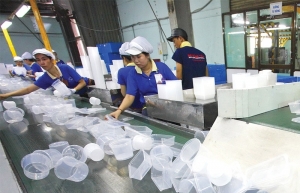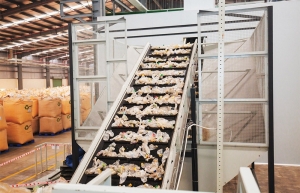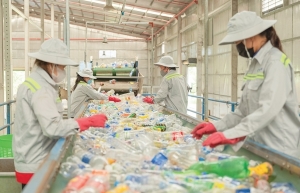Pending issues will be ironed out on regulations around EPR
The new decree clarifies who is responsible for EPR. These subjects combine producers and importers (organisations and individuals) who are responsible for the quality and labelling of products and goods in Vietnam according to the provisions of the law on the quality of products and goods. This is a suitable approach for EPR systems worldwide, with object identification mainly based on brand owners and trademarks.
 |
| Nguyen Thi, Senior legal expert, Department of Legal Affairs, Ministry of Natural Resources and Environment |
At the same time, the new decree adds cases that are not required to implement EPR. These subjects are producers that have put packaging on the market, but that packaging is recovered and repackaged to be put back on the market. The condition is that the ratio of recovery and packaging continued to be brought to the market is higher than the mandatory recycling ratio as prescribed in the decree.
The amended and supplied decree also clarifies the determination of responsibility based on the mandatory recycling ratio of the volume of products and packaging produced and imported that were put on the market in the previous year. According to previous regulations, the number of products and packaging that must be recycled by the importers is based on the amount imported in the previous year (counting the number of goods still in storage).
Another important article of the new decree is that regulations on publishing the list of recyclers are more convenient and clear. Accordingly, recycling facilities published on the National EPR Information System are the basis of environmental permits or ingredient environmental permits, instead of previously regulating the condition for the announcement as “must ensure environmental protection requirements according to the provisions of law” in a general way.
In addition, regulations on conditions to become an intermediary recycling organisation have been amended to ensure efficiency and optimisation of the recycling organisation process, especially for the authorisation process to recycle packaging. For example, in the packaging segment, the legal authorisation organisation must be authorised by at least 10 producers and importers who are responsible for recycling products and packaging in the same subgroup.
The regulations in the amended decree facilitate recycling activities as well as control compliance with recycling ratios and mandatory recycling specifications, thereby removing the regulation on minimum requirements for recovered materials. In addition, it stipulates recycling specifications, applies minimum recycling specifications such as classification into commercial scrap, and do not require high requirements for mandatory recycling specs to create input materials for processing and other industries.
The amended decree clearly defines the responsibilities of producers and importers in registering and reporting recycling results. It also clarifies that registration and reporting of recycling results are based on the actual volume of products and packaging produced and imported that are put on the market.
These amendments and supplements are important and will contribute to removing almost all difficulties and problems for producers and importers having the task of implementing EPR, especially producers and importers in terms of rubber tyres inner tubes, batteries, lubricant oils, and cartons, who had to start the declaration from the beginning of 2024.
After three months of the implementation of their responsibility, we see that the community of producers and importers in rubber tyre inner tubes, batteries, lubricant oils, and cartons are proactive in declaring the information, studying the guides, and approaching the information.
We have also received many opinions from producers and importers about the complexity of the declaration process. Some pending issues are to identify the object responsible for EPR, the documents to prove their declaration, and the products and ratios for declaration, among others. They are also confused about looking for legal recycling firms and authorised organisations.
The producers and importers expressed their concern because if they miss the deadline in the declaration and the implementation of their EPR, they will be fined, and simultaneously still complete their responsibility. The highest fine level is at VND1 billion ($42,200) for violating individuals and VND2 billion ($84,400) for organisations.
In front of the concerns of producers and importers, the Ministry of Natural Resources and Environment has organised training courses. In the coming time, a circular will be approved on the management of contribution paid by producers and importers into the environmental protection fund to support waste recycling and treatment.
This circular is an important legal base to build up official personnel to guide producers and importers during processing of the declaration and implementation of EPR as well as financial support for recyclers.
 | Businesses take easy EPR compliance route Many businesses are wrestling over the decision to pay emissions fees or organise recycling themselves, even though extended producer responsibility regulations have already been in effect for a couple of months. |
 | Movement underway to promote EPR Extended producer responsibility regulations are opening opportunities for collectors and recyclers to enter an industry that is still in its infancy in Vietnam, but possesses much development potential. |
 | Unilever Vietnam striving to implement sustainable EPR The active cooperation between Unilever and various recyclers and collectors regarding extended producer responsibility regulations has cemented its determination to promote the plastic economy and accelerate sustainable development. |
What the stars mean:
★ Poor ★ ★ Promising ★★★ Good ★★★★ Very good ★★★★★ Exceptional
Related Contents
Latest News
More News
- Citi economists project robust Vietnam economic growth in 2026 (February 14, 2026 | 18:00)
- Sustaining high growth must be balanced in stable manner (February 14, 2026 | 09:00)
- From 5G to 6G: how AI is shaping Vietnam’s path to digital leadership (February 13, 2026 | 10:59)
- Cooperation must align with Vietnam’s long-term ambitions (February 13, 2026 | 09:00)
- Need-to-know aspects ahead of AI law (February 13, 2026 | 08:00)
- Legalities to early operations for Vietnam’s IFC (February 11, 2026 | 12:17)
- Foreign-language trademarks gain traction in Vietnam (February 06, 2026 | 09:26)
- Offshore structuring and the Singapore holding route (February 02, 2026 | 10:39)
- Vietnam enters new development era: Russian scholar (January 25, 2026 | 10:08)
- 14th National Party Congress marks new era, expands Vietnam’s global role: Australian scholar (January 25, 2026 | 09:54)

 Tag:
Tag:



















 Mobile Version
Mobile Version